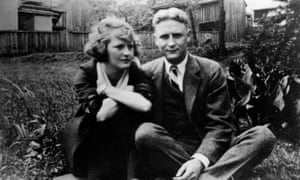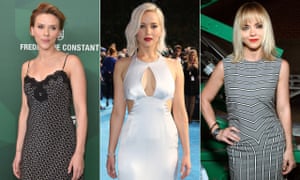Tragic, fascinating, brilliant – life of ‘wild child’ Zelda Fitzgerald revisited
Two films and a TV series out soon portray the life of the jazz-age writer and wife of F Scott FitzgeraldSarah Hughes
Sunday 30 October 2016
Their marriage was flawed but deeply loving.
Photograph: Alamy
She is thought of as the original wild child, a pearl-twirling party girl who died at the age of 47 after a fire broke out in the North Carolina sanatorium where she was a patient. Now Zelda Fitzgerald, the southern belle turned jazz-age heroine, dubbed “the first American flapper” by her husband and partner-in-drink Scott, is to have her own Hollywood make-over – two films are in the pipeline and a television series will air on Amazon Prime early next year.
All three projects have starry names attached: Jennifer Lawrence will take the lead in Zelda, a biopic directed by Ron Howard and based on Nancy Milford’s best-selling biography; Scarlett Johansson will bob her hair for The Beautiful and The Damned; and Christina Ricci will play the young and impetuous Zelda in the Amazon series Z: The Beginning of Everything. The title of the TV series comes from Scott’s awestruck comment on meeting Zelda: “I love her, and that’s the beginning and end of everything.”
 |
| Scott Fitzgerald, Zelda and Scottie |
So what is it about Zelda that fascinates almost 70 years after her tragic end? In part it is that the upheavals the couple lived through find an echo in our own tumultuous times.
“Interest in the Fitzgeralds has definitely been on the increase – not only since Baz Luhrmann’s film of The Great Gatsby in 2013 but also from the many parallels between their lives and work and the period we’re living through right now,” says Sarah Churchwell, author of the critically acclaimed Careless People: Murder, Mayhem and The Invention of the Great Gatsby.
“It’s a story of boom and bust and it resonates as we are grappling with our own boom and bust, our own worries about the cost of our excesses and our own social failures. The lives and fortunes of Scott and Zelda peculiarly mimicked their eras: in the 1920s they were roaring for all they were worth, but with the crash in 1929, everything fell apart.”
It helps, too, that Zelda was so vibrant a figure. “It begins with her beauty,” says Churchwell. “But also with the stories told in the 1920s about the high jinks and fun she and Scott seemed to have. People really liked her: she was surprising, intelligent, shrewd, funny and loved a good party. She also liked to be the centre of attention, and so had her detractors too. These things combined to make her a legend.”
Scott repeatedly returned to their relationship in his fiction, most notably in his second novel, The Beautiful and Damned, which details the heady early days of their marriage; and his melancholy fourth, Tender Is The Night, in which the gilded dream has faded into a more tawdry reality. Zelda’s only novel, Save Me The Waltz, presented the relationship from her side.
They were arguably America’s first celebrity pairing: a carefree golden couple who wrote their way into the spotlight, creating their own mythology of gin-soaked days and fun-filled nights, only to linger too long once the light had started to dim. “Their recklessness makes the story exciting and dramatic,” says Churchwell. “But they paid a very high price.”
After a few giddy years, all the youthful promise crumbled away, leaving Scott a dazed and drunk jobbing hack in Hollywood and bringing Zelda to breakdown at the age of 30, a diagnosis of schizophrenia, now widely thought to be a bipolar disorder, and a life in and out of sanatoriums.
“Her story is both fascinating and tragic,” says Therese Anne Fowler, on whose novel Z the Amazon series is based. “Here we have a woman whose talents and energy and intellect should have made her a brilliant success, who was determined to be an accomplished artist, writer and ballet dancer in an era where married women were supposed to be wives and mothers, period. Her devotion to Scott was, in many ways, her undoing [although] he was just as imprisoned as she was. Had they loved each other less, they might both have come to better ends.”
The idea of Zelda as a brilliant woman trapped by her time has gained traction in recent years, with a number of works re-evaluating her through the prism of feminism – although it is not always the easiest of fits. As early as 1974, the couple’s daughter Scottie resisted such claims, writing that attempts to view her mother as a “classic ‘put-down’ wife, whose efforts to express her nature were thwarted by a typically male chauvinist husband” were not accurate.
Writing in the New Yorker in 2013, Molly Fischer agreed, noting: “Saving Zelda Fitzgerald is no easy proposition...[she] does not want to be anyone’s pet, and there’s something disconcerting about the literary readiness to domesticate her, to transform an exasperating woman into an appealing heroine.”
The new films may well further “Hollywoodise” Zelda, sanding away her rough edges and reinventing her as a relatable heroine for our modern times. The casting of Lawrence – so often described as “America’s Sweetheart” – in the Howard biopic is no accident.
A report about the upcoming Johansson film in the Hollywood Reporter suggested it would draw on previously unreleased material to “indicate that her husband misappropriated his wife’s ideas as his own”.
Mark Gill, president of Millennium Films, the production company behind The Beautiful and The Damned, agrees: “She was massively ahead of her time and she took a beating for it. He stole her ideas and put them in his books. The marriage was a codependency from hell with a jazz-age soundtrack.” The film has, however, secured the co-operation of the Fitzgerald estate.
Fowler agrees that there is a growing tendency to apply our own concerns to Zelda. “We do anoint her as a kind of proto-feminist heroine, even though she didn’t see herself as a feminist and didn’t fully succeed at anything,” she says. “But her original reputation is based on conventional paternalistic standards of what a woman, mother and wife ought to be and do. Her ambitions and her insistence on pursuing them were considered inappropriate and unhealthy; after her psychotic break she was literally told that this insistence had created her ‘split mind’ and that the path to a cure lay in giving up all ambitions that didn’t conform to the paternalistic ideal.”
The backlash against this image is understandable given that popular opinion of Zelda was initially driven by Ernest Hemingway’s notoriously caustic descriptions in A Moveable Feast, published posthumously in 1964, in which he dismissed her as insane and blamed Scott’s growing dependence on drink on his wife.
“Our perception has very much changed,” says Churchwell. “We have come to sympathise with her frustration, to recognise her gifts and to be more fair-minded about her choices.” That said, she cautions against attempts to create a Team Scott/Team Zelda divide, as is so often the case in famous literary partnerships. “It’s important to say that they always loved each other and wouldn’t have appreciated people taking sides… Fitzgerald wrote a few years before he died that it was a ‘moral imperative’ that their friends understood they were a couple, a unit and would stay that way, even if her illness meant they couldn’t live together.”
Churchwell is also scathing about attempts to suggest Zelda had a larger role in her husband’s work than previously presumed. “There are people who want to credit Zelda with Scott’s work, which is just silly and doesn’t do women any favours,” she says. “It’s not a zero-sum game: we can recognise both of them for who they were.
“Zelda had many talents, but where writing was concerned she was probably too ill when she started to hone her gifts, and while it is true that Scott didn’t particularly want her to write – partly out of territoriality but partly because her doctors told him it was bad for her – it’s also true that her work isn’t in the same class as his…. Her individual sentences are often lovely, and she can create a mood and has clever turns of phrase but her works tend to be sketches rather than full stories. If they had made different choices, maybe she could have been an important writer, but the reality is that she wasn’t.”
Perhaps, then, the true key to Zelda’s continued pull on our imagination lies not in her work but in her modernity. “I don’t want to live – I want to love first and live incidentally,” she proclaimed and it is that vitality and greed for all of life’s experiences, both good and bad, that stretches down over the decades, allowing each generation to see something new.
Z: The Beginning of Everything will air on Amazon Prime early next year
THEY SAID …
‘I have rarely known a woman who expressed herself so delightfully and freshly: she had no ready-made phrases on the one hand and no striving for effect on the other.’ Critic Edmund Wilson
‘I fell in love with her courage, her sincerity and her flaming self-respect, and it’s these things I would believe in even if the whole world indulged in wild suspicions that she wasn’t all that she should be.’
F Scott Fitzgerald
‘I did not have a single feeling of inferiority, or shyness, or doubt, and no moral principles.’
‘All I want is to be very young always and very irresponsible, and to feel that my life is my own to live and be happy and die in my own way to please myself.’
‘Other people’s ideas of us are dependent largely on what they’ve hoped for.’





No comments:
Post a Comment